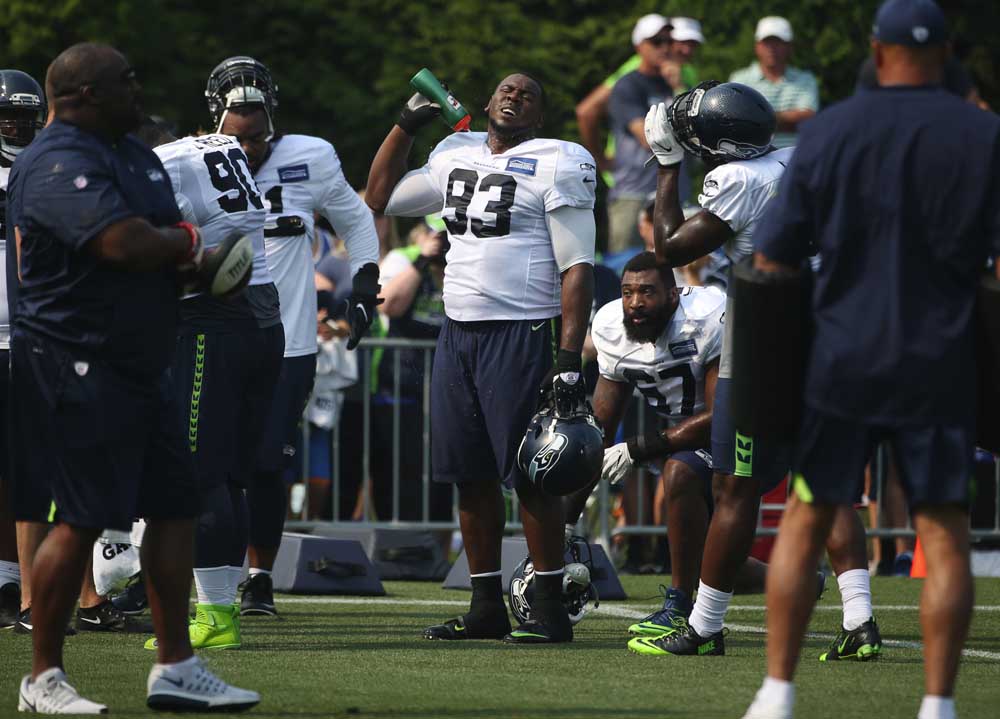This time, fight at Seahawks practice crossed the line
Published 11:11 pm Thursday, August 3, 2017

- Seattle defensive tackle Jeremy Liggins cools off during a practice Thursday when things got so heated Frank Clark was kicked out.(Ken Lambert/The Seattle Times)
It was hardly a surprise that Seattle Seahawks players were in a grumpy and feisty mood Thursday. It was oppressively hot at their facilities in Renton, Washington, the practice was especially physical, and the “just happy to be back playing football” vibe of early camp had all but worn off.
That a little extracurricular venting would take place was predictable. A bigger surprise, in fact, would have been if there was NOT a fracas or three during the Seahawks’ intense two-hour morning workout. You are seeing this sort of thing at training camps all around the NFL right about now as the monotony, hypercompetitiveness and grueling nature of practices elicit a murky stew of emotions that set large, aggressive men on edge.
“Scuffles happen in camp,” said defensive lineman Michael Bennett. “We’ve built up so much testosterone all of camp, and we want to go out here and battle every single time. Sometimes we go a little overboard.”
Bennett, more than almost anyone, knows of what he speaks. It was almost precisely a year ago that he and then-rookie Germain Ifedi scrapped early in Seahawks’ camp.
It was one of a handful of dust-ups that Seahawks coach Pete Carroll partially dismissed as “the passion coming out.”
But what made Thursday’s scuffle stand out — and let us be more accurate here, at its peak it bordered on a brawl — is that there was none of the normal dismissive rhetoric. No one said something along the lines of, “Hey, this sort of thing happens between brothers,” the boilerplate explanation for camp fights since time immemorial.
That is because this one crossed a line. And no one did so with more misguided aggression than defensive end Frank Clark, who appeared to clock a helmetless Ifedi in the face with a punch after normal pushing and shoving had escalated into something more.
Now, it has been clearly shown in the year-plus he has been in Seattle that Ifedi has a way of getting under the skin of defensive players, even those on his own team. But if you are Clark, you have to have enough poise and self-control to realize that slugging a teammate to the extent that he stayed down on the ground and had to receive medical treatment is not acceptable.
Clark was escorted off the field — kicked out of practice, in other words. Ifedi walked off with a trainer. Carroll indicated that the likely starting right tackle was not seriously hurt, but as fragile as the Seahawks’ offensive line already is, risking an injury to one of its would-be stalwarts was a reckless move by Clark.
It is no wonder that Carroll was irked afterward. It has been my observation over the years that most coaches secretly enjoy, even savor, practice scuffles because they reveal intensity and competitiveness. While coaches may be outwardly stern in condemning them, it is often with a slight twinkle that indicates that they like the spirit behind the brouhaha.
But there was none of that this time from Carroll. The Seahawks are built on the foundational theme of competitiveness, but it is supposed to be aimed at the other team.
Admittedly, it is hard to rein that in when you are fighting for a job and trying to prepare for a harsh NFL season.
But Carroll said flatly: “There’s no room for fighting in football. It is not part of this game. It’s not supposed to be part of this game, and we frown upon that very heavily. Real disappointed that that happened today. We have to learn and get better and be right.”
Carroll said the staff will “take a big stance against it” in talking with the team. That is not likely to entirely curb all the fisticuffs that come out of demanding, mano-a-mano drills like the one between the offensive and defensive lines that set things off Thursday.
But maybe it will stop players from losing their composure in a way that even Bennett said “may have crossed that line.” Finding the hypothetical line of demarcation can be a tricky thing when the aforementioned testosterone is flying, but a necessary one.
“I know fighting to the point where you’re hurting each other, that’s the line I think we draw,” Bennett said. “I think the line is to respect your teammates and to know that at the end of the day, this is practice, and it’s not a game.”
Bennett showed some admirable self-awareness when asked if he, as a respected veteran, needed to be some of those helping to establish the boundaries.
“You have to set that tone, but I’m just as guilty as the next person,” he said. “If I get too heated, I jump in there too. I make mistakes just like any other player. But it’s about learning from your mistakes and coming in and trying to rebuild that camaraderie again after something like that happens.”
Yeah, these things happen in football. But they cannot happen like this.
— Larry Stone is a columnist for The Seattle Times






